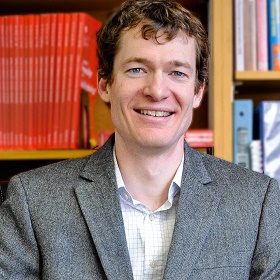Social
Psychology (Social Psychology Specialization) |
Social Psychology Specialization
Jamie Barden, Ph.D., is Associate Professor of Psychology at Howard University. The central theme of his research is to find evidence of the mechanism underlying evaluative judgments, including both meta-cognitive and automatic processes. A second theme is to explore the consequences of placing the self and others into social categories (race, gender, sexual orientation). The bulk of his research reflects the intersection of these two themes. Current projects in the lab include investigating meta-cognitive processes underlying certainty judgments (including the role of accessibility and certainty in standardized test performance), stereotype traits that are unique to the ingroup, and racial identity tailoring in advertising. Dr. Barden has been on the HU faculty since receiving his Ph.D. in Social Psychology Specialization from Ohio State in 2005.
Dr. Barden’s work is published in JPSP, JESP, PSPB and SPPCompass, he has served as Associate Editor at BASP, and his research has been supported by APF and NSF. He is Co-Director of the Howard-NAEP Statistics and Evaluation Institute, which is fully supported by Educational Testing Service (ETS).
Contact: Barden Lab, jamie.barden.PHD@gmail.com, 202-806-9451.
Angela P. Cole Dixon, Ph.D., is Professor of Psychology at Howard University. She earned her BS in psychology, with a minor in mathematics, at Howard University and her PhD in cognitive psychology at Stanford University. She was awarded a pre-doctoral fellowship and dissertation fellowship by the American Psychological Association’s Minority Fellowship Program. She was a Post-Doctoral Fellow in the Research Center for Group Dynamics at the University of Michigan’s Institute for Social Research. Her research focuses on information-processing models of decision making, social cognition and personality, and has resulted in publications in Health Psychology; Law and Human Behavior; Brain, Behavior and Immunity; Basic and Applied Social Psychology; Archives of Clinical Neuropsychology; and African American Research Perspectives. She has received external funding from the National Science Foundation, the American Psychological Association, and the Department of Homeland Security. She is Chair of the Natural Sciences Division in the Howard University College of Arts and Sciences, Co-Director of the Howard University Chair Leadership Academy, and the director of her department’s Decision-Making Research Working Group. She is a member of the APA Psychology Summer Institute Selection Committee and has chaired an American Association for the Advancement of Science Health, Education and Human Services Science and Technology Policy Fellowship Selection Committee for the past two years.
Lloyd Ren Sloan, Ph.D., is Professor of Psychology and NIMH Research Training Program Director (COR Program) at Howard University. He received his baccalaureate from the University of Texas (mathematics and psychology) and his Ph.D. in Social Psychology Specialization at the Ohio State University where he also served as a Postdoctoral Fellow. His research at OSU included political media impacts on attitude change and decision-making, attribution, social judgment and mechanisms underlying human and animal sociability. Dr. Sloan’s initial faculty position was at the University of Notre Dame where his research interests expanded to include judgments of hypocritical behaviors, violent media impacts on judgment, and group success (especially in sports) influences on affect and self and group identity. His enduring interest in the attractions of, and identity impacts of, sports for fans led to exciting research both at Notre Dame and in his current position at Howard University. Dr. Sloan’s other key research interests include the causes and consequences of Stereotype Threat’s detrimental effects on stereotyped group members performance, stereotypes and evaluations of persons belonging to multiple categories, ostracism and social exclusion, social and personal trait relationships to health and mental health, social cognition and its interactions with affect/arousal, time orientation influences on behavior, social biases in judgments of justice across cultural groups. Scholarship includes edited books, chapters, articles and numerous abstracts and presentations and he has held grants from NIH, the Department of Education and private foundations.
Contacts
Program Details
- Related Degrees: Ph.D.
- Program Frequency: Full-Time
- Format: In Person



